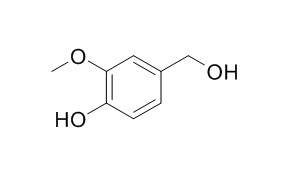Vanillyl alcohol
Vanillyl alcohol possesses anti-angiogenic, anticonvulsive, anti-inflammatory, anti-oxidant, neuroprotective, and anti-nociceptive activities. Vanillyl alcohol can effectively inhibit the cytotoxicity and improved cell viability in 1-methyl-4-phenylpyridinium (MPP+)-induced MN9D dopaminergic cells, it also can attenuate the elevation of reactive oxygen species (ROS) levels, decrease in the Bax/Bcl-2 ratio and poly (ADP-ribose) polymerase proteolysis.
Inquire / Order:
manager@chemfaces.com
Technical Inquiries:
service@chemfaces.com
Tel:
+86-27-84237783
Fax:
+86-27-84254680
Address:
1 Building, No. 83, CheCheng Rd., Wuhan Economic and Technological Development Zone, Wuhan, Hubei 430056, PRC
Providing storage is as stated on the product vial and the vial is kept tightly sealed, the product can be stored for up to
24 months(2-8C).
Wherever possible, you should prepare and use solutions on the same day. However, if you need to make up stock solutions in advance, we recommend that you store the solution as aliquots in tightly sealed vials at -20C. Generally, these will be useable for up to two weeks. Before use, and prior to opening the vial we recommend that you allow your product to equilibrate to room temperature for at least 1 hour.
Need more advice on solubility, usage and handling? Please email to: service@chemfaces.com
The packaging of the product may have turned upside down during transportation, resulting in the natural compounds adhering to the neck or cap of the vial. take the vial out of its packaging and gently shake to let the compounds fall to the bottom of the vial. for liquid products, centrifuge at 200-500 RPM to gather the liquid at the bottom of the vial. try to avoid loss or contamination during handling.
Food Bioscience2024, 58:103691.
Front Pharmacol.2023, 14:1244655.
Appl Microbiol Biotechnol.2016, 100(9):3965-77
Phytochem Anal.2024, 35(3):483-492.
Biomed Pharmacother.2021, 144:112300.
Oncology Letters2018, 4690-4696
Int J Mol Sci.2020, 21(9):3392.
Adaptive Medicine 2020, 12(1): 4-10
Iranian Journal of Pharmaceutical Sciences2021, 17(2):25-36
J Agric Food Chem.2017, 65(13):2670-2676
Related and Featured Products
Biotechnol Prog. 2012 Nov-Dec;28(6):1450-6.
Specificity of maltase to maltose in three different directions of reaction: hydrolytic, vanillyl alcohol glucoside and vanillyl alcohol isomaltoside synthesis.[Pubmed:
22927369]
Vanillyl alcohol glucoside is very attractive molecule due to its very powerful physiological activity.
METHODS AND RESULTS:
In this article, a detailed kinetic study of transglucosylation of Vanillyl alcohol was performed. It was demonstrated that this reaction is very efficient (selectivity factor is 149) and occurred by a ping-pong mechanism with inhibition by glucose acceptor. At low concentration of Vanillyl alcohol one additional transglucosylation product was detected. Its structure was determined to be α-isomaltoside of Vanillyl alcohol, indicating that Vanillyl alcohol glucoside is a product of the first transglucosylation reaction and a substrate for second, so the whole reaction mechanism was proposed.
CONCLUSIONS:
It was demonstrated that the rate of isomaltoside synthesis is two orders of magnitude smaller than glucoside synthesis, and that maltase has interestingly high K(m) value to maltose when Vanillyl alcohol glucoside is second transglucosylation substrate.
Theranostics. 2017 Jun 24;7(9):2463-2476.
Ultrasonographic Imaging and Anti-inflammatory Therapy of Muscle and Tendon Injuries Using Polymer Nanoparticles.[Pubmed:
28744328 ]
Ultrasonography is a reliable diagnostic modality for muscle and tendon injuries, but it has been challenging to find right diagnosis of minor musculoskeletal injuries by conventional ultrasonographic imaging.
METHODS AND RESULTS:
A large amount of hydrogen peroxide (H2O2) are known to be generated during tissue damages such as mechanical injury and therefore H2O2 holds great potential as a diagnostic and therapeutic marker for mechanical injuries in the musculoskeletal system. We previously developed poly(Vanillyl alcohol-co-oxalate) (PVAX), which rapidly scavenges H2O2 and exerts antioxidant and anti-inflammatory activity in H2O2-associated diseases. Based on the notion that PVAX nanoparticles generate CO2 bubbles through H2O2-triggered hydrolysis, we postulated that PVAX nanoparticles could serve as ultrasonographic contrast agents and therapeutic agents for musculoskeletal injuries associated with overproduction of H2O2. In the agarose gel phantom study, PVAX nanoparticles continuously generated CO2 bubbles to enhance ultrasonographic echogenicity significantly. Contusion injury significantly elevated the level of H2O2 in skeletal muscles and Achilles tendons. Upon intramuscular injection, PVAX nanoparticles significantly elevated the ultrasound contrast and suppressed inflammation and apoptosis in the contusion injury of musculoskeletal systems.
CONCLUSIONS:
We anticipate that PVAX nanoparticles hold great translational potential as theranostic agents for musculoskeletal injuries.
Molecules, 2011, 16(7):5349-61.
Neuroprotective effects of vanillyl alcohol in Gastrodia elata Blume through suppression of oxidative stress and anti-apoptotic activity in toxin-induced dopaminergic MN9D cells.[Pubmed:
21705974 ]
Gastrodia elata Blume (GE) has long been used in oriental countries as a traditional herbal medicine to relieve symptoms associated with neurological ailments such as vertigo, general paralysis and epilepsy.
METHODS AND RESULTS:
In this study, we have investigated the effects of GE extracts and its major bioactive components on 1-methyl-4-phenylpyridinium (MPP+)-treated MN9D dopaminergic cells, a classic in vitro model for Parkinson's disease (PD). We found that Vanillyl alcohol effectively inhibited the cytotoxicity and improved cell viability in MPP+-induced MN9D dopaminergic cells. The underlying mechanisms of Vanillyl alcohol action were also studied. Vanillyl alcohol attenuated the elevation of reactive oxygen species (ROS) levels, decreased in the Bax/Bcl-2 ratio and poly (ADP-ribose) polymerase proteolysis.
CONCLUSIONS:
These results indicate that Vanillyl alcohol protected dopaminergic MN9D cells against MPP+-induced apoptosis by relieving oxidative stress and modulating the apoptotic process and is therefore a potential candidate for treatment of neurodegenerative diseases such as Parkinson's disease.



